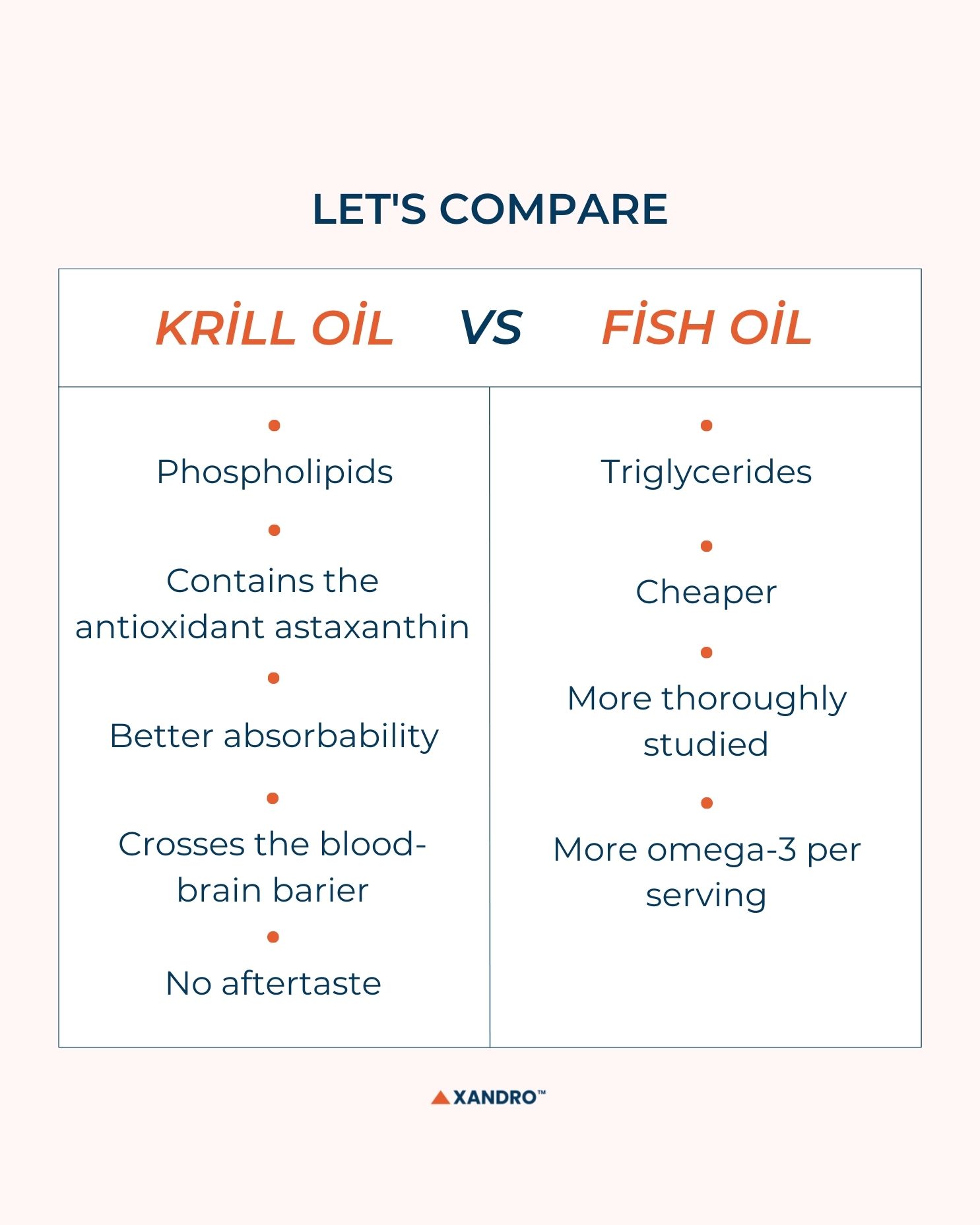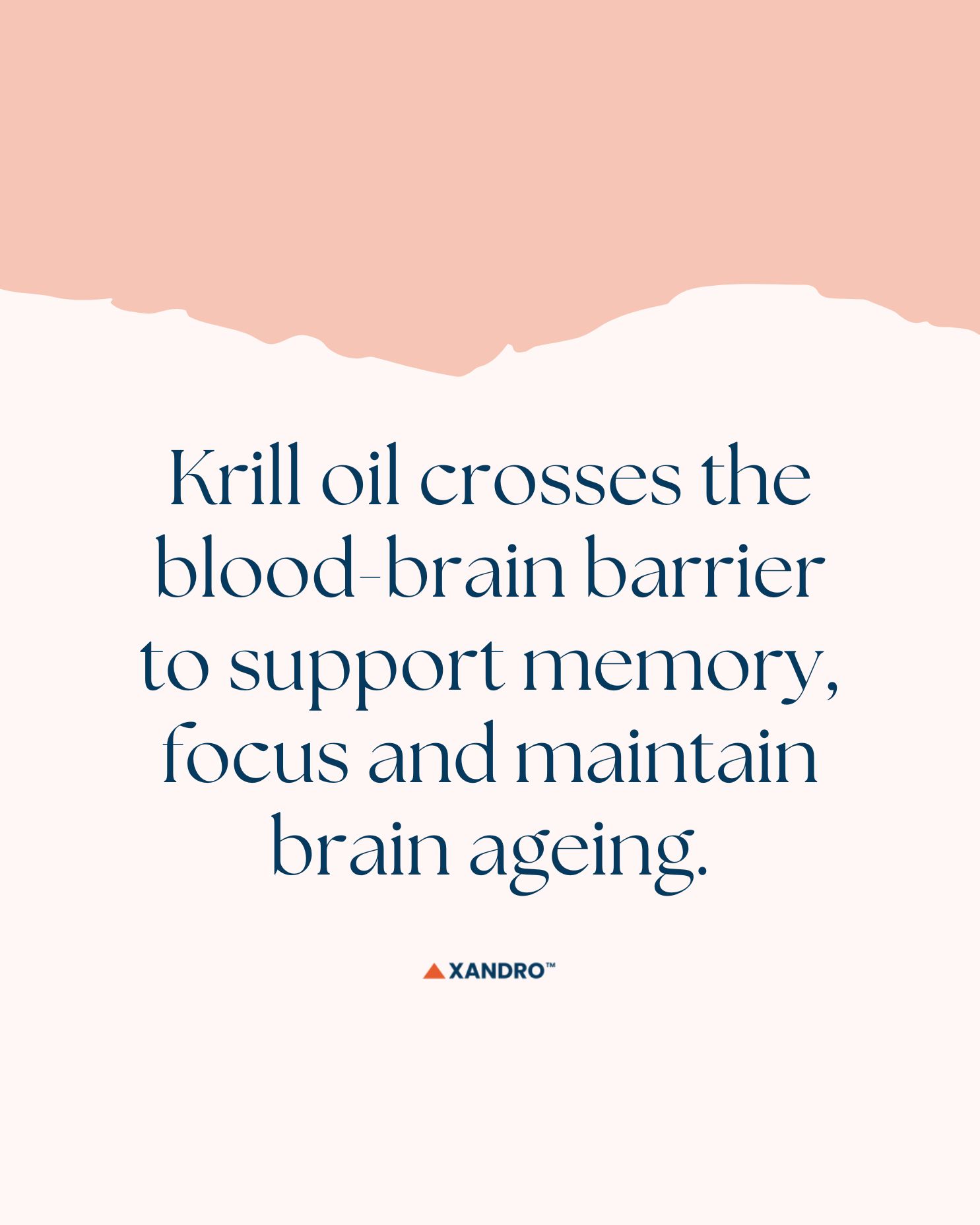Krill Oil vs Fish Oil: Benefits, Dosage and Key Differences
5th Jan 2025
Krill Oil vs Fish Oil: Which One Is Right for You?
Omega-3 fatty acids are widely recognised for their health benefits, particularly for heart and brain health. Among the many sources of omega-3s, fish oil has long been commercially available, but other forms have emerged as contenders, including krill oil, which studies suggest might offer unique advantages.
Further Reading: All About Omega-3 Fatty Acids
This blog will compare krill oil and fish oil to help you decide which is the best choice for your health. Jump there now:
- What Is Krill Oil?
- What Is Fish Oil?
- How Much Omega-3 Do They Contain?
- Can You Take Krill Oil and Fish Oil Together?
- Is Krill Oil Better for You Than Regular Fish Oil?
- Who Should Choose Krill Oil?
- Who Should Choose Fish Oil?
- Who Should Not Take Krill Oil and Fish Oil?
Krill oil comes from tiny crustaceans called Antarctic krill. These shrimp-like creatures are a dietary staple for marine animals like whales and penguins. Like fish oil, krill oil is rich in the essential omega-3 fatty acids EPA (eicosapentaenoic acid) and DHA (docosahexaenoic acid), but krill oil’s omega-3s are chemically structured as phospholipids, which may make them easier for the body to absorb. Krill oil also contains astaxanthin, a potent antioxidant that gives it a reddish hue.
Recent research has also uncovered a unique component in krill oil: lysophosphatidylcholine (LPC). LPC plays a key role in transporting DHA and EPA to the brain and other organs. This discovery has led to the development of the patented LYSOVETA™, an omega-3 supplement that uses this LPC EPA and LPC DHA unique delivery mechanism.
On the other hand, fish oil comes from fatty fish like salmon, mackerel and anchovies. Its omega-3s are primarily stored as triglycerides. This supplement has been extensively studied and is known for improving heart and brain health, reducing inflammation and supporting overall well-being. Fish oil supplements are typically yellow or gold in colour and widely available.

How much omega 3 in krill oil? Krill oil supplements typically contain about 45–200mg of EPA and DHA per capsule, whereas fish oil supplements often deliver 300–2,200mg or more per serving. While fish oil offers a higher concentration of omega-3s per dose, although this varies depending on the specific supplement, the phospholipid structure in krill oil may enhance its absorption, potentially allowing for similar benefits at lower doses.
It’s generally safe to take both krill oil and fish oil, but there’s little evidence to suggest added benefits from combining them. Since both provide EPA and DHA, taking them together might exceed the recommended daily intake of omega-3s, potentially leading to side effects. Always speak with your doctor before combining supplements to make sure the dosage is appropriate for your needs.
How do krill oil and fish oil compare? Let’s go over krill oil benefits to see how they stack up against the long-used fish oil.
Absorption and Bioavailability
Some studies suggest that the body absorbs krill oil better than fish oil due to its phospholipid structure. For example, one study found that participants who took krill oil had higher blood levels of EPA and DHA compared to those who took fish oil, suggesting it has a better absorbability. Another study even found that even when taking lower amounts of krill oil, EPA and DHA levels raised the same amount as those who took higher amounts of fish oil.
This is due to krill oil’s phospholipid structure, otherwise known as LPC EPA and LPC DHA. This allows the EPA and DHA to cross the blood-brain barrier and support brain and eye health.
Further Reading: The difference between LPC DHA and LPC EPA
Antioxidant Content
Does krill oil help with inflammation? Krill oil contains astaxanthin, an antioxidant that may protect the body from oxidative stress, protect against neurological conditions, inflammatory conditions and cardiovascular disease, and support heart health. Fish oil, on the other hand, lacks this antioxidant. Astaxanthin may also help krill oil resist oxidation, potentially giving it a longer shelf life, although more research is needed to determine this.
What about krill oil vs fish oil for joint pain? Fish oil supplements have research behind them in helping with arthritis symptoms, but this is due to the omega-3s EPA and DHA, which krill oil also contains. One study found krill oil improved knee pain, stiffness and function in those with knee osteoarthritis.
Brain Health
What about krill oil vs fish oil for brain health? While the brain needs EPA and DHA to reduce inflammation and to support cellular brain health, most fish oil supplements struggle to cross the blood-brain barrier, meaning they’re not very effective in improving memory or preventing cognitive decline. Krill oil, on the other hand, has been found to cross the blood-brain barrier through a transporter called Mfsd2a, helping then to maintain brain ageing and support focus and memory.
This means It may also help lower the risk of Alzheimer’s disease, especially for those with the APOE4 gene who have a higher chance of developing the disease.

Heart Health Benefits
So, krill oil vs fish oil for cholesterol. Both krill oil and fish oil support heart health, but some research suggests krill oil may be more effective at improving certain risk factors. If you’re wondering, ‘Can krill oil raise cholesterol?’ then it’s actually the opposite. One study found that krill oil was better at reducing LDL (‘bad’) cholesterol, triglycerides and blood sugar compared to fish oil — even at a lower dose.
Cost and Accessibility
Fish oil is typically much cheaper and more accessible than krill oil. Krill oil’s higher cost is due to its more expensive harvesting and processing methods. If budget is a concern, fish oil may be the more practical choice. Just know that if you’re taking fish oil for your brain, it practically does nothing as the EPA and DHA in fish oil cannot cross the blood-brain barrier like LPC EPA and LPC DHA.
Further Reading: Why Standard Fish Oil Supplements Are Useless for The Brain
Environmental Impact
Krill oil is often considered more sustainable than fish oil because krill populations are abundant and well-managed. Still, overharvesting could impact marine ecosystems, so choosing sustainably sourced products is essential.
Dosage Recommendations
Krill oil vs fish oil dosage: The recommended daily intake for omega-3 fatty acids is 1.6 grams for men and 1.1 grams for women, although this is for ALA, the third omega-3. There is currently no recommended daily dosage for EPA and DHA. The upper limit for EPA and DHA from supplements is generally 2g per day to avoid immune suppression. Always read the supplement label to ensure you’re not exceeding the recommended dosage.
- Better absorption: If you want potentially enhanced bioavailability.
- Antioxidant boost: For the added benefits of astaxanthin.
- Heart health: If you’re interested in preliminary studies suggesting krill oil’s superior efficacy.
- Sustainability: If you prefer environmentally friendly options.
- Brain support: If you want to leverage the unique LPC in krill oil for better DHA delivery to the brain.
- No Aftertaste: Does not have a fishy aftertaste, which some people dislike about fish oil.
- Affordability: If you’re looking for a cost-effective omega-3 supplement.
- Proven research: If you value a product with a long track record of scientific support.
- Ease of access: If availability and variety are important to you.
Both krill oil and fish oil are generally safe but may cause minor side effects like bad breath, stomach upset or heartburn. Because both supplements can have mild blood-thinning effects, make sure you speak with your doctor if you’re on blood-thinning medications or have a bleeding disorder. Also, avoid these supplements if you have allergies to fish or shellfish.
End Note
Krill oil and fish oil are both excellent sources of omega-3 fatty acids, with unique advantages and drawbacks. Whichever supplement you choose, make sure it’s sustainably sourced and meets your specific health needs and always speak with your doctor before starting any new supplement, especially if you have medical conditions or are taking medications.
If you’re looking for the best krill oil supplement, look for one with LYSOVETA™, which uses marine oil from krill, such as Xandro’s LPC Neuro. LYSOVETA™ is the most advanced form of omega-3 for the brain, so if you’re getting older and are worried about mental decline, you might want to look into taking LPC Neuro to boost your brain health and slow your ageing. Learn all about it here.
